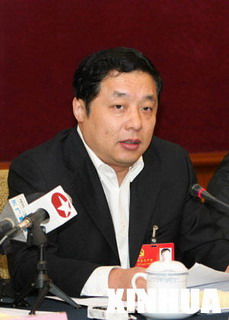China
Delegates acclaim CPC´s determination in curbing corruption
Source: Xinhuanet | 10-18-2007 21:06
Special Report: 17th CPC National Congress |
Zhou Guoxiong, a delegate from Shanghai, E China attends the ongoing 17th CPC CPC National Congress on Oct. 18, 2007. (Xinhua Photo)
BEIJING, Oct. 18 (Xinhua) -- The Communist Party of China (CPC) is determined to curb corruption by establishing a preventive mechanism and strengthening law enforcement, delegates attending the Party's national congress said.
Hu Jintao said Monday morning in the political report to the 17th CPC National Congress, "Resolutely punishing and effectively preventing corruption bears on the popular support for the Party and on its very survival, and is therefore a major political task the Party must attend to at all times."
Hu's report was acclaimed by delegates to the ongoing Party congress.
Zhang Xiaoping, a delegate from Sichuan Province, said, "Generally speaking, our Party's organism is healthy and the mainstream of Party members are well qualified."
"The iron fists of our Party against corruption just show the resolution and determination of the Party to crack down on bad things," Zhang said.
A senior official of the Central Commission for Discipline Inspection revealed that in the single year of 2005, a total of 11,071 people were expelled from the Party because of embezzlement or taking bribes, 7,279 out of whom were transferred to judicial organs for further investigations.
By June 2007, a total of 24,879 commercial bribe cases had been investigated, with concerned amount of bribes reaching more than 6.156 billion yuan (820.8 million U.S. dollars). Government employees were involved in 5,523 bribe cases, taking up 22.2 percent.
"While resolutely cracking down on corruption," Hu told the congress, "we will work harder to remove its root cause and take preventive measures through improving relevant institutions and expanding our efforts to curb corruption at the source."
"The root cause of corruption is the imperfect institution, ineffective supervision and loose ethics education," delegate Han Peixin said.



